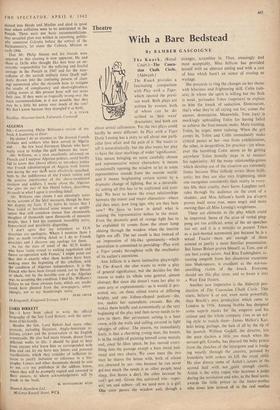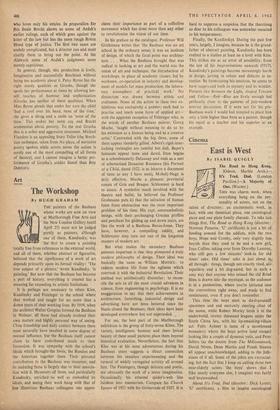Theatre
With a Bare Bedstead
By BAMBER ASCOIGNE
The Knack. (Royal Court.)—The Cauca- sian Chalk Circle. (Aldwych.) The Knack provides a fascinating comparison
with Play with a Tiger, which opened the previ-
ous week. Both plays are written by women, both of whom can be de- scribed as 'new wave' dramatists; and both are about sexual callousness. Yet the two plays could hardly be more different. In Play with a Tiger Doris Lessing has a story to tell about one parti- cular love affair and the pain of it. She wants to tell it naturalistically, but she also wants her play to have the clear markings of wider `significance.' This means bringing on some carefully chosen and representative minor characters; it means occasionally opening the window to let in some representative sounds from the outside world; and it means heightening certain scenes by a dramatic change of lighting. But in a naturalis- tic setting all this has to be explained and justi- fied. We have to know the exact relationships between the minor and major characters—where did they meet, how long ago, why are they here now?' We -have to know in detail what is causing the representative noises in the street. Even the dramatic pool of orange light has to be explained (it comes from the street lamp shining through the window when the interior lights are off). The net result is that instead of an impression of life-like spontaneity—which naturalism is committed to providing—Play with a Tiger creaks throughout with the mechanics of its author's intentions.
Ann Jellicoe is a more instinctive playwright. In The Knack she also wants to write a play of general significance, but she decides for this reason to make its whole tone general, almost abstract. But since she doesn't want her play to seem arty or expressionistic—as it would if pre- sented, say, on three stilted rostra of differing heights and one kidney-shaped podium—she, too, makes her naturalistic excuses. But she, makes them briefly and economically at the very beginning of the play and then never needs to re- turn to them. Her permanent setting is a bare room, with the walls and ceiling covered in light splurges of colour. The reason, we immediately learn, is that a charming young man, the tenant, is in the middle of painting himself some murals; and, since he likes space, he has moved every- thing into the passage except a bare metal bed- stead and two chairs. We soon meet the two men he shares the house with, both of whom are obsessed by sex—one because he can never get too much (he needs it as other people need sleep, five hours a day), the other because he can't get any. Given this universal trio---super- sex; sex and subsex-7-all we need now is a girl. Otte soon passes the window and, though a stranger, scrambles in. Thus, amusingly and most acceptably, Miss Jellicoe has provided herself with an abstract setting and with a cast of four which hasn't an ounce of overlap or wastage.
She proceeds to ring the changes on her theme with hilarious and frightening skill. Colin (sub- sex), in whom the spirit is willing but the flesh is weak, persuades Tolen (supersex) to explain to him the knack of seduction. Domination, that's what they're all crying out for, comes the answer, domination. Meanwhile, Tom (sex) is mockingly upbraiding Tolen for having failed to achieve the four-minute make. More training, Tolen, he urges, more training. When the girl comes in, Tolen and Colin immediately make cynical passes at her—one from exhibitionism, the other, in desperation, for practice—yet when- ever the bumbling Colin seems to be getting anywhere Tolcn brutally steps in to reassert his superiority. All the many relationship-games which develop out of the situation are extremely funny because Miss Jellicoe writes them brilli- antly; but they are also very frightening, since one recognises consistently their reality in every- day life, their cruelty, their harm. Laughter surf- rides through the audience on the crest of a shudder, and Miss Jellicoe's harsh jeu d'esprit proves itself more, true, more angry and more moving than all Miss Lessing's weightiness.
There are elements in the play which could be improved. Some of the arias of verbal ping- pang are too artificial, some of the set speeches too set; and it is a mistake to present Tolen as a jack-booted automaton just because he is a sexual Fascist—there are enough of them around to justify a more 'familiar presentation. But James Bolam proves himself, as Tom, one of our best young actors. And Rita Tushingham, re- turning unspoilt from her ,disastrous excursion into Shakespeare, is excellent as the not-too- unwilling victim of the knack. Everyone should see this play soon, and so boost it into a West End theatre.
Another new imperative is the Aldwych pro- duction of The Caucasian Chalk Circle. This starts, believe it or not, even more powerfully than Brecht's own production which came to London in 1956. Annetta Stubbs has designed some superb masks for the emperor and his retinue and the whole company rises to an act- ing style to match them—James Mellor's Kaz- beki being, perhaps, the best of all by the tip of his paunch. William Gaskill, the director, lets the pace slacken a little too much when the servant-girl, Grusha, has rescued the baby prince from the clutches of the insurgents and is trudg- ing wearily through the country, pursued by Ironshirts with orders to. kill the royal child. He also directs some of Azdak's scenes in the second half with not ,quite enough clarity. Azdak is the witty rogue,. who becomes a judge during the re, olution and who, in the final scene. awards the little prince to the foster-mother who loves him instead of to the real mother who loves only his estates. In preparation for this finale Brecht shows us some of Azdak's earlier rulings, each of which goes against the letter of the law but has the same rough Robin Hood type of justice. The first two cases are unduly complicated, but a director can and must clarify them to bring out the point. At the Aldwych some of Azdak's judgments seem merely capricious.
In general, though, this production is lively, imaginative and successfully Brechtian without being too academic about it. Patsy Byrne has the right sturdy qualities as Grusha, though she spoils her performance at times by allowing her- self touches of humour and sophistication (Grusha has neither of these qualities). When Miss Byrne pleads that under her care the child 'had a roof over his head, most of the time,' she gives a shrug and a smile on 'most of the time.' This makes her seem coy and Brecht sentimental about poverty. To the real Grusha this is a sober and aggressive statement. Michael Flanders is an appealing Story Teller (the Brech- tian technique, taken from No plays, of narrative poetry spoken while actors mime the action is surely one of the most compelling of all forms of theatre), and I cannot imagine a better per- formance of Grusha's soldier fiance than Roy Dotrice's.



































 Previous page
Previous page